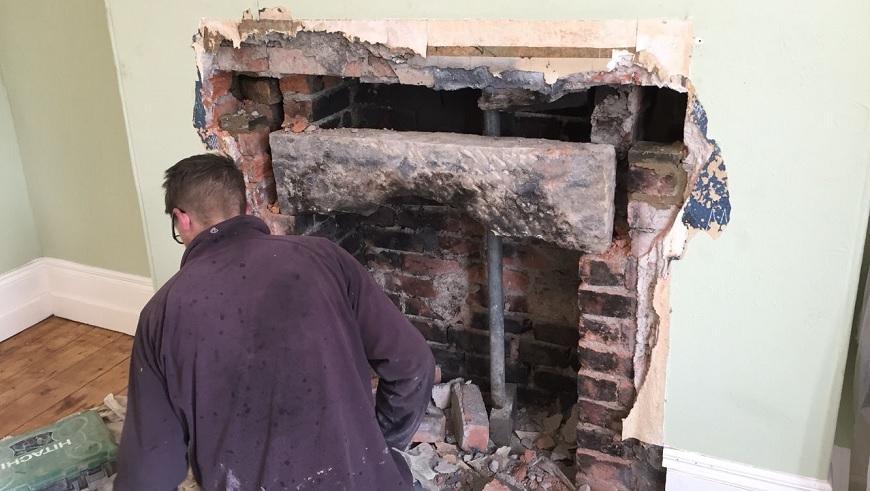Chimney Breast Removal Cost
Last updated 14th May, 2025
What does it cost to remove a chimney breast?
This chimney breast removal cost guide breaks down all the costs you may incur when having a chimney breast removed. We look at different types of chimney breasts, the methods used, labour fees, timeframes and much more!
Continue below for more information!

Table of Contents
How Much to Remove a Chimney Breast?
The average cost of removing a chimney breast is around £1,500 to £3,000.
Your total price will depend on the size of your chimney and whether or not scaffolding will be used during the renovation.
As it is not necessary to remove the whole chimney and stack you need to evaluate what’s necessary for your renovation work. You also need to incorporate the prices charged by additional tradesmen who may be required.
Chimney Breast Removal Prices
The table below gives an idea of the costs of hiring a specialist to remove your chimney breast:
| Description | Avg. Cost | Duration |
|---|---|---|
| Removing chimney stack only | £1,200 - £1,400 | 4 - 8 hours |
| Removing a ground floor chimney breast | £1,500 - £1,750 | 1.5 - 2 days |
| Removing a first-floor chimney breast | £1,750 - £2,000 | 1.5 - 2 days |
| Removing entire chimney breast without removing stack | £2,200 - £2,400 | 2 - 3 days |
| Removing entire chimney breast and stack | £3,000 - £3,500 | 3 - 4 days |
Chimney Breast Removal Cost Breakdown Calculator
The calculator below breaks down the individual costs of removing an entire chimney breast without the stack - Total Cost: £2,300
Materials
£1,035
Tradesmen
£920
Waste Removal
£345
Labour Cost To Remove Chimney Breast
The process of removing the chimney breast itself is likely to require two builders working together.
Builders will often charge between £150 and £250 per day each, so the labour cost of chimney breast removal is likely to be between £300 and £500 per day.
As builder prices will vary depending on where you are in the country, you will probably be quoted higher rates in London and the South East compared to elsewhere in the UK.
It may be cost-effective to hire a company capable of doing the whole job from start to finish but you need to ensure that they are competent in all of the different areas.
You should also consider seeking out quotes from specialists in the areas of work you require to get an idea of how much everything would cost separately.
Structural Engineer Cost
A survey from a structural engineer is crucial when you're considering this work, so you should factor it into your overall chimney breast removal cost.
The structural engineer will design the structural support that will be used in place of the chimney breast.
Typically, the hourly rate for a structural engineer starts from around £90 per hour. However, this will vary based on location and some engineers will quote for a project based on a flat fee rather than an hourly rate.
How Long Will It Take to Remove a Chimney Breast?
The length of time it will take for a full chimney breast removal will depend on the scale of the job.
Removing just an interior chimney breast will often take 1 to 2 days.
However, if you need the chimney stack removing as well as the chimney breast, this will usually take between 3 and 4 days.
Bear in mind that the overall chimney removal cost will be significantly increased if you require both the stack and breast removed, primarily due to the additional labour costs involved.
Additional Chimney Breast Removal Costs
The cost to remove chimney elements like chimney breasts will usually incur other costs too.
Be aware that you might need the services of other tradesmen or companies for the following additional jobs:
- Scaffolding
- Plastering
- Flooring
- Ceiling tiles
- Decorating
- Waste removal
Some of these may be unnecessary for your chimney breast removal but if you aim to have the area around your old chimney space decorated or utilised in another way, you will need to factor these into your chimney breast removal cost.
You may also decide to do some of these things yourself, potentially saving yourself money on other tradesmen costs.
Gas Safe Engineer
If the chimney breast you are removing has previously been used for a gas fire, it is essential to ensure this is made safe.
A Gas Safe engineer is a specialist who works with gas appliances and is the only tradesman authorised to work on them.
Heating engineer prices will vary but expect to pay around £44 per hour on average. Some engineers will have a minimum call-out fee, so double-check what the final bill is going to be.
What Does Chimney Breast Removal Involve?
There are a number of stages involved in the removal of a chimney breast.
After breaking down the chimney breast, you will need to have a structural reinforcement such as a steel beam fitted in order to secure the integrity of the building.
Removing a chimney breast has an impact on the structure of the building, so before any work is carried out, you will need to contact your local council to find out about the necessary building regulations that you must follow and check whether there is any planning permission required.
In addition, it is crucial that you ensure that your builder is highly experienced and has the expertise to complete the various elements of work that a chimney breast removal involves.
You may find that in addition to the chimney breast, you also have to have the chimney stack removed.
In some cases, your chimney may be part of a shared central chimney system, which means that you will need to adhere to the 1966 Party Wall Act. A party wall will make the job more complex and take longer to complete, so you will need to consider how this will affect your overall costs.
As well as replacement structural support, the work to remove your chimney breast will also involve fitting robust insulation and damp-proofing. It is useful to bear in mind that the type of structural support, insulation and damp-proofing that you choose will affect the final cost of the job.
Rolled Steel Joist (RSJ) steel beams are the most commonly used type of structural support because they can provide a substantial amount of reinforcement across a wide area. Gallows brackets are an older type of support that are only effective in certain situations and are dependent on the thickness and condition of the walls.
Can I Remove a Chimney Breast Myself?
Removing a chimney breast affects the very structure of your home and involves many stages and tradesmen, thus it is not a job that you should attempt yourself or hope to complete within a short space of time.
Further, every part of the work should be carried out by experienced tradesmen and follow all related building regulations and health and safety requirements.
Regulations for Chimney Breast Removal
Before any work is carried out, you will need to contact your local council and submit a Building Notice or Full Plans application.
This step cannot be avoided, and you can be fined if you fail to engage with your local authority. Penalties will vary depending on which authority you're under, but they can be significant.
A building control officer will visit your property to understand the changes you're going to make and why. They will also inspect the job once it has been completed to ensure it's safe.
Your local authority may refuse the application for several reasons:
- You don't provide calculations and drawings from your structural engineer or these are incomplete.
- The building support described is deemed insufficient.
- There will be a knock-on effect on the stability of another part of the building that has not been considered properly.
- Adequate ventilation has not been considered or there is an impact on fire safety.
- You have failed to serve a Party Wall Notice to neighbours.
- Your home is listed or in a conservation area.
Some of these problems are surmountable and may be resolved by submitting plans that are more complete or addressing certain outstanding issues.
However, others may cause significant delays to work beginning on your chimney breast removal or, in the case of listed building status, may prevent it entirely.










